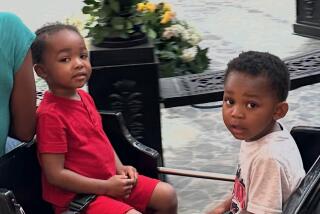Adopting the Terminally Ill : One Special Family Opens Its Arms to the Dying
- Share via
OMAHA, Neb. — The children in Jesse Running’s photo album are all shown lying in coffins. All died before the age of 16.
Jesse and Russ Running began caring for terminally ill children about 10 years ago when Mrs. Running met 7-year-old Karen, a girl who had suffered severe brain damage in a car accident.
“All I could do was cry when I first saw her,” Mrs. Running said.
The family cared for Karen until she died at 15. “I became very bonded to that child, as though she was our own,” she said.
Since then, the Runnings have either adopted or taken as foster children five other terminally ill children. All have died except 3-year-old Missy, who “is still hanging in there.”
Adopted and Foster Children
They now have six adopted and foster children, four of whom have severe health problems.
“It’s pretty hard to explain,” Mrs. Running said, when asked why her family takes ill children. “You have to have words in order to make other people understand feelings and that’s hard for me to do.”
Missy spends much of her day in a baby seat, gasping for air. A rare blood disease has paralyzed her.
“Some doctors may call her a vegetable,” Mrs. Running said. “I’ve never met a vegetable. The children will respond to the person they are bonded to, even if it isn’t any more than a knowing look in their eyes or a slight grin.
“You can tell when a child is happy. That lets you know that you are that special person in their life.”
Photos in her album show one young girl splashing in a swimming pool and playing with the Runnings’ biological children. Another picture shows her in a coffin. She was 6.
Mrs. Running said her husband works while she cares for her three foster and three adopted children. They have eight biological children but only the youngest, 15-year-old Chris, still lives at home.
Breathes Through Hole
One of the adoptees is a 10-year-old boy from South America who swallowed a cup of lye when he was about 1. He’s normal in every way, except that he breathes through a hole in his windpipe.
Their three foster children include a 23-year-old profoundly retarded quadriplegic woman, a 4-year-old girl who’s also a quadriplegic and who suffers from cerebral palsy, and a 2-year-old girl who weighed little more than a pound at birth and who still relies on oxygen to breathe.
The Runnings get state aid for their foster children, but Mrs. Running says it’s never enough. However, she said the state does pay for the foster children’s medical care and medical equipment.
The children have come to the Runnings through referral from doctors and by word-of-mouth. Some parents have come to them directly and asked that they take care of dying children.
“It’s too hard for them to be with the child emotionally,” she said about such parents.
At some point, Mrs. Running said she may no longer be able to stand the pain.
“After each death, I go through a lot of soul-searching and say ‘I can’t do this anymore.’ But then you get another phone call asking you to take care of a child who is dying and what do you say? No? For me, it seems, it starts all over again.”
More to Read
Sign up for Essential California
The most important California stories and recommendations in your inbox every morning.
You may occasionally receive promotional content from the Los Angeles Times.













